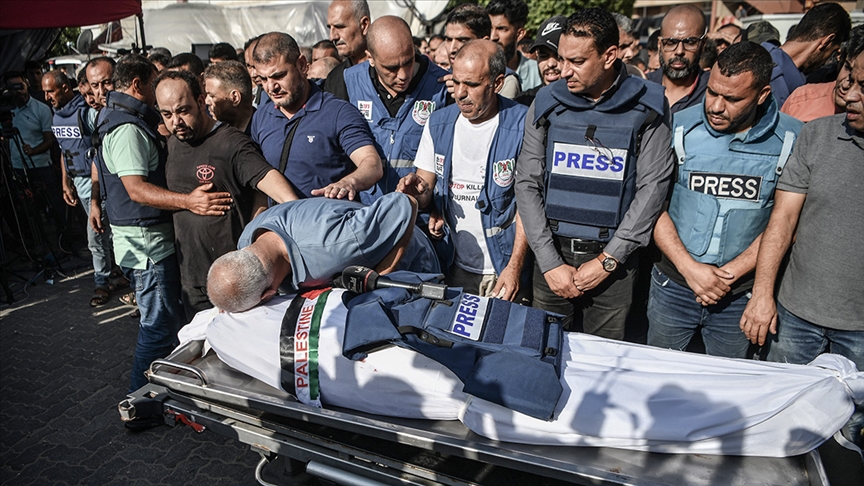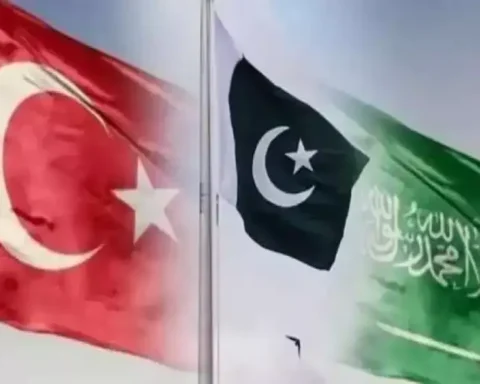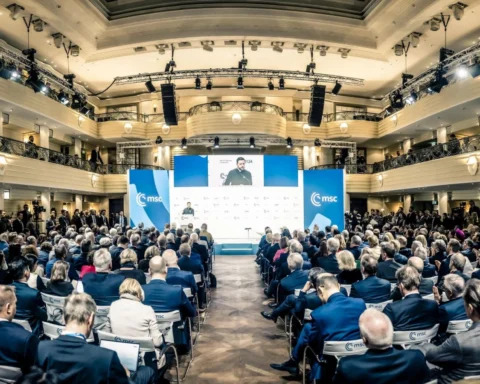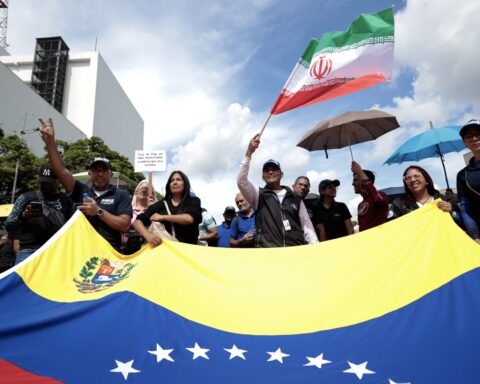It was the year 2013. As Anadolu Agency, we were going to open an office in Gaza. In the hundred-year history of the agency, an office had never been opened in either Jerusalem or Gaza. So, we were excited. At that time, I was the president of Anadolu Agency. I wanted to go there myself to see the office, meet the staff, and begin operations.
As soon as we stepped through the Rafah border gate in Egypt, there was a powerful explosion not far from us. I felt the force of the explosion in my chest. Gaza was under bombardment again, and Israeli drones were flying overhead, making a buzzing sound like hornets. All along the road, we were calculating whether a bomb would fall on us or not.
When we reached the center of Gaza, the bombings were still continuing intermittently. We had secured one of the middle floors of a multi-story building. There, we met with our staff. They were all young Palestinian journalists.
We were opening this office to make Gaza’s voice heard around the world. We would no longer be dependent on Reuters or Agence France-Presse (AFP). As the agency of a Muslim country, we would report what we witnessed here to the entire world in seven different languages.
The young Palestinian journalists were excited for this reason. They would not only make their country’s suffering known to the world, but also have the opportunity to work for an international agency.
During the meeting, most of them were holding walkie-talkies and quietly listening to them. Whenever we heard the sound of a bomb, they would immediately listen intently to the incoming announcement. The moment it was clear where the strike had hit, one of them would grab their camera or video equipment and rush out to film the scene, then return to the office. My cameraman, Ömer, had his leg bandaged; he had been injured in a bombing, but he was still working.
After one of the announcements, one of the young men said, “It’s not our home…” In fact, they weren’t just listening to the announcements for news coverage—they were also trying to find out whether their families were safe. While on duty, they had left their children, their parents, back home and were out chasing the news.
I was deeply moved. Perhaps if it were us, we would have left the news behind and gone to be with our families. But these young people had stayed on the scene, leaving their families behind. After I left, Israel bombed the building where the agency’s Gaza office was located, rendering it unusable. The agency had to continue its work in another building.
As Anadolu Agency, we had correspondents in 70 countries around the world, and during my time in office, I had never seen journalists as dedicated, hardworking, and courageous as the Palestinians. They were working heroically, risking their lives.
When the latest attacks on Gaza began, I received messages and videos from Yaser el Benna, one of the staff members at the office. Then messages came from other colleagues as well. After a while, the messages stopped. I can no longer reach them.
Now, those young and courageous journalists from 2013 have grown up, and their numbers have increased. Today, there are even more journalists in Gaza to report the suffering the region endures. What has not changed is Israel’s oppression and bombardment. Yet, we are witnessing something unprecedented in the history of global journalism: within just two years, Israel has killed nearly 240 journalists and wounded hundreds more.
Not even during World War II were so many journalists killed in such a short span of time.
By killing the journalists there, Israel aimed to suppress the dissemination of its oppression—to silence it, to keep it from being seen or heard around the world. But what it failed to realize is that it cannot intimidate Palestinian journalists with death.
Now, being a writer for Al Jazeera—the organization that has lost the highest number of martyred journalists—carries a special meaning for me. In the years after I left Anadolu Agency, some of its journalists were martyred as well. And now, it is the journalists of the institution I write for who are being killed. This is a deeply personal tragedy for me…
Every time a journalist falls, another steps in without hesitation, picks up the fallen camera, the bloodied microphone, the lens—and continues to carry Gaza’s, Palestine’s voice to the world…
This is a story of great heroism. These brave young people are writing a chapter in journalism history that has never been seen, heard, or written before.
Nur Abu Rukba, who immediately took over the duties of slain Al Jazeera correspondent Muhammad Karika, is just one of those heroes. His words shook hearts, brought tears to eyes, and at the same time, strengthened our resolve and our faith:
“By God’s permission, I am a traveler on the same path, the path of the same cause. And I know: Our meeting place is paradise.”
What journalist in the world begins their job knowing they will be killed? What person in the world runs onto the field wearing the bloodstained vest of a slain journalist? What journalist in the world takes on the duty of martyrdom with such courage?
The Palestinians are giving us journalists a profound lesson—and telling the world an unforgettable story. They are documenting the genocide their country is suffering while also writing the story of their own struggle for survival.
If the Pulitzer and World Press Photo juries were even slightly fair, they would give their annual awards to Palestinian journalists. I am certain that in the history of these two institutions, there has never been such an example of journalism, never such a story of courageous heroism. But I cannot say that I have much faith in their sense of justice.
We journalists have witnessed many events in war zones, crisis regions, and conflict areas. But none are as unique and instructive as the experiences of the journalists in Gaza.
I am certain that one day the gates of Gaza will open, and I will write articles from there recounting the magnificent heroism of these journalists. I will visit the graves of those heroes, kiss the foreheads of the survivors, and share their story with the entire world.
For this, I work, I pray, I resist…
I bow my head in respect to the memory of those heroic journalists.






